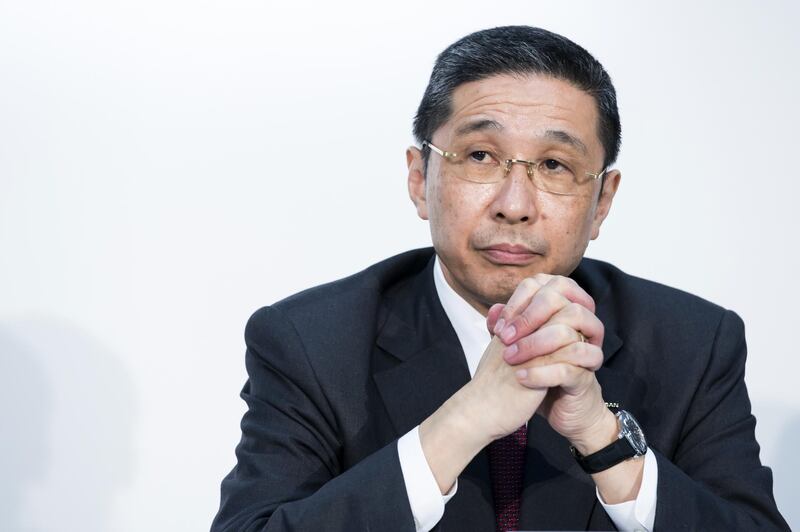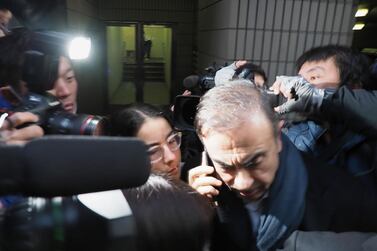As Nissan chairman, Carlos Ghosn went all-in on China by approving a plan to invest $9 billion, yet the newly installed chief executive at the Japanese car maker appears to be rolling that back.
Nissan is cutting a future target for China car sales by about 8 per cent, sources said on Tuesday. Nissan and Dongfeng Motor now forecast their joint venture will sell 2.39 million vehicles in 2022, the end of the current mid-term plan. That is a reduction of more than 200,000 units from the previous target, the sources said, and the revision is being discussed as chief executive Hiroto Saikawa embarks on a programme to put profitability before growth in sales volume. That includes possibly taking a break from introducing new models in China.
“You need to invest to survive,” Toliver Ma, an analyst at Guotai Junan Securities in Hong Kong, told Bloomberg. “All players, big or small, will need a plan for their electric vehicles, especially to compete in China.”
Nicholas Maxfield, a spokesman for Nissan, said last week the company, based in Yokohama, hasn’t made any announcements regarding changes to its China business plan. Nissan’s venture with Dongfeng said it will review the mid-term targets and may make adjustments based on market conditions. Dongfeng Motor Group shares fell 1.2 per cent in Hong Kong on Wednesday. Tokyo exchanges were closed on Thursday for a holiday.
Under Mr Ghosn, Nissan pledged to invest $9bn over five years in China and introduce 20 electrified models by 2022. It intended to boost annual deliveries by 1 million units, compared with last year’s sales total of 1.56 million vehicles, including imports.
Mr Saikawa’s mandate to Nissan executives is to not focus on sales volume – as Mr Ghosn did – but rather to boost profit. No major new Nissan models are now planned for the China market through 2020, and its luxury Infiniti brand plans no new vehicles through 2021.
Given current conditions, this is probably the right approach, said Janet Lewis, an analyst at Macquarie Capital Securities in Japan.
“The move by Saikawa to improve the profitability of sales, even if it means a lower market share, is correct," she said.
Nissan doesn’t comment on its product plans, Mr Maxfield said.
Also on Tuesday, Bloomberg cited sources as saying Nissan paid tuition for all four of Mr Ghosn’s children when they attended Stanford University between 2004 and 2015.
The perk was part of Mr Ghosn’s employment contract from 1999, when he was hired as chief executive, one source said. The benefit, which isn’t common among top executives, would have been worth at least $601,000, according to fee schedules published by Stanford during the years his children were enrolled.
That report comes the day after the Financial Times said a $40 million lump sum payment to Mr Ghosn was approved by Mr Saikawa as part of a proposed retirement package.
The new chief executive approved a 10-year employment contract for Mr Ghosn as "chairman emeritus", according to a 2012 document seen by the FT. The employment contract also permitted him continued use of company properties in Rio de Janeiro, Paris and Lebanon.
Under the agreement, Nissan was expected to make a lump-sum payment of $40m for the advisory role after Mr Ghosn stepped down, and provide an annual salary of $4.4m, which would be increased to $6m if the company met certain targets.
The employment agreement was signed by Mr Saikawa and Greg Kelly, another Nissan board member who was charged with conspiring with Mr Ghosn to falsify Nissan’s financial statements. Mr Kelly has denied the charges. It is not clear if the document was the final version of the agreement.
On his deferred compensation, Mr Ghosn has said there was no undisclosed binding contract with Nissan for a fixed amount of pay. He was arrested on November 19 and later charged with falsifying his pay in financial documents. He denies all charges and will go to trial after being freed on bail earlier this month.
Nissan declined to comment as did Mr Ghosn’s lawyer in Paris, Jean-Yves Le Borgne, while a spokesman for Stanford in California didn’t respond to requests for comment.







